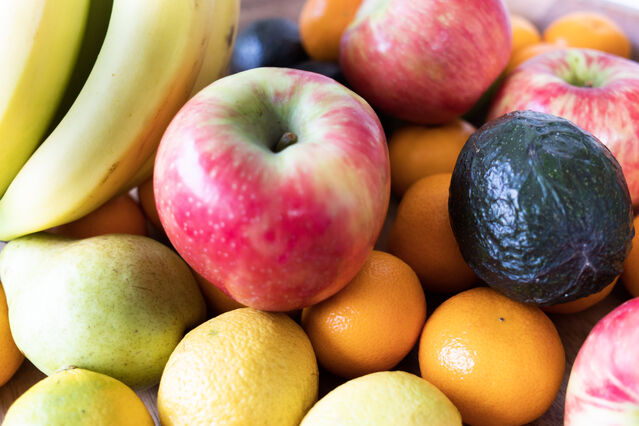Diet
10 Intuitive Eating Tips for a Healthier Relationship with Food
Learn how to stop binge eating and develop healthy eating habits.
Posted March 9, 2021 Reviewed by Chloe Williams
- Intuitive eating involves relying on your body’s natural cues to guide your eating rather than following rigid ideologies or diets.
- Intuitive eating is linked to better psychological functioning, reduced disordered eating behaviors, a reduced risk for binge eating, and better behavioral health.
- There are many ways to practice intuitive eating, such as avoiding a diet mentality, listening to your body's natural hunger signals, and giving yourself permission to eat what you please.

This post was written by Gia Marson, Ed.D.
Intuitive eating is a simple, natural, and powerful way to relate to food. It means integrating your innate instincts, your emotions, and your rational thinking process to nourish your body intuitively, without the need for rigid ideologies that hurt instead of help you.
Intuitive eating is a path to a more attuned lifestyle, and it’s the epitome of good self-care.
When you rely more on your body’s natural cues, you feel good, decrease feelings of shame, and protect against pervasive cultural messages of weight-related self-judgment. That’s important because shame and guilt are associated with general eating disorder symptomatology and specifically with binge eating.
Recent evidence also shows that intuitive eating leads to better psychological functioning, reduced disordered eating behaviors, significantly less risk for binge eating, and better behavioral health.
Here are 10 intuitive eating tips to enable you to apply intuitive eating principles and sustain healthy eating, whether this is your first time trying it or you’ve been on the journey for some time.
1. Pack Up the Diet Mentality and Throw It Away
You don’t have to search too hard to find books, advertisements, and social media influencers who promote the diet mentality. They lure you in with stunning before-and-after photos and promises of massive body transformations through things like magical teas and waist trainers. Though prevalent, this diet culture is damaging, inundating you with false hope and moving you further away from knowing your own unique body.
The diet mentality sets you up for failure, in part, because trying to avoid thinking about food actually increases your food thoughts. Avoidance may even increase disordered eating behaviors like overeating and lack of control. This is known as the dietary restraint theory. Recognize the danger in diet promotions and throw their diet ideas away. They’re not helpful, they’re hurtful. And the more you can reject their falsehoods, the more in tune with yourself you can become.
2. Respect Your Natural Hunger Signals
For your body to have the energy it requires to keep you healthy and active throughout the day, you need to incorporate a variety of foods into your meals. When you deprive your body of its natural hunger signals and underfeed, you set off a primal response that pressures you to eat beyond a comfortable level of fullness when food is available. When you allow your body to reach this point, you’re likely to experience the urge to binge eat. Instead of depriving yourself, listen to your body’s natural signals for hunger and provide it with the nutrition it’s asking for.
Prime yourself for attunement by getting adequate sleep, not skipping meals, reducing levels of stress, eliminating harsh self-talk, not multitasking during meals, setting aside time to relax, reaching out during times of stress, not eating while distracted, and engaging in supportive relationships. Respecting your body’s natural hunger cues is one of the most crucial steps for rebuilding the links between your body and food.
3. Create a Peaceful Connection with Food
Recognize that food is not an enemy. Rather, it’s a source of sustenance, satisfaction, and even pleasure. With intuitive eating, you’re allowed to eat freely, according to your body’s requirements, and encouraged not to demonize certain food types or ingredients. When you deprive your body of foods that you categorize as “bad,” you ironically create a strong pull toward indulging in them. In fact, when parents restrict their child’s eating, the child often eats more of this “forbidden fruit” and becomes disconnected from their body’s cues. In adults too, this can lead to overeating in the absence of stomach hunger. And when you give in, you are left feeling guilty, stressed, and upset.
While it’s true that all foods are not nutritionally equivalent, it is important that you begin to view them as emotionally equivalent. Instead, give yourself permission to eat what you please, and remain mindful of how your body responds.
“Binge eating is absolutely not about not having self-discipline! Binge eating is often related to emotional experiences, a traumatic experience, learned behaviors (often in childhood), and/or the result of attempting diet after diet. My goal is to wipe out all messages that have inundated my clients with regard to food and to impart the true meaning of food: that food should be used to fuel our bodies, to connect with people, and sometimes appropriately used in response to emotional experiences.” —Tracey Engelson, R.D. The Binge Eating Prevention Workbook: An Eight-Week Individualized Program to Overcome Compulsive Eating and Make Peace with Food
4. When the Food Police Calls, Don’t Answer
We’ve all fallen victim to that voice in our head that tells us it’s okay to restrict our daily caloric intake or categorize certain foods as “bad.” That voice screams at you to limit your intake, shames you for enjoying your meals, and tries to convince you to monitor every morsel of food that enters your mouth. But guess what? Those messages are coming from diet culture conditioning that has infiltrated your psyche.
When you can counteract those thoughts with kind and loving reminders that your relationship with food doesn’t include the opinions of third parties, you can begin to listen to your body and ignore the shaming messaging you’ve been bombarded with throughout your life. Your body is sacred and deserves your love and care.
5. Learn to Revel in That Satisfied Feeling
Part of your experience as a human being involves satisfaction and pleasure. Contrary to popular belief, food isn’t just a means of energy production. Your body is equipped with taste buds for a reason.
Allow yourself to bask in the flavors of your favorite meals and snacks, and enjoy the feelings of satisfaction and contentment that flood your body when you’ve nourished it well. It’s your body’s way of thanking you for taking good care of it.
6. Trust Your Body’s Inherent Full Response
When you’re tuning into your body’s natural hunger cues, you are also opening your awareness to when your body signals fullness. Learn to recognize that feeling of satisfaction when you’re eating. Pause and listen to your body. Are you comfortably full? If the answer is no, continue your meal or increase your portion size so your body can feel satisfied. If the answer is yes, save the rest of your food for later. You may find that within just a few hours, your body is ready to finish that meal. The idea is to be nonjudgmental of your body’s needs and grateful for all those nutrients you’re taking in.
If you want to challenge yourself, plan to have one meal without any distractions: Create a positive environment and set boundaries that allow you to truly experience the taste of your food and your body’s response to it. Allow yourself to tune into your body and provide it with what it’s asking of you.
7. Address Your Emotions with Curiosity and Kindness
Contrary to popular practice, food does not ease depression and is not a cure for boredom. If you are feeling overwhelmed by emotions, ask yourself what you need besides food, and find appropriate ways to cope.
Sometimes that means speaking with a therapist, spending creative time with your favorite hobby, or developing a meditative practice to help you gain better control over your thoughts. This way, when you’re eating, you can trust you’re listening to your body’s physical hunger, the request for nourishment and satisfaction, and not using food as a means of coping with your natural spectrum of emotions.
8. Honor Your Body’s Natural State
When you’re bombarded with images of bodies that don’t reflect your own size or shape, you can feel inadequate, as if you are not “measuring up.” However, just as your height, shoe size, and skin color are innate parts of your existence as a human being, so is your body’s shape.
Learn to pause and appreciate your uniqueness; your body works incredibly hard daily to keep you alive and keep you healthy. It deserves your gratitude and admiration for all it does for you.
9. Move Your Body and Note How You Feel
Listen to your body when you move it. Notice how it feels after you walk around the block, practice deep stretching, or challenge it with strength training. Set aside expectations that tell you you must work out for a specified amount of time, burn a certain number of calories, or practice a bootcamp routine at the same pace as everyone else. Notice whether your body feels energized or depleted.
Remember that working out isn’t a prerequisite to eating. Yes, your body needs movement in the same way that it needs food, sleep, and water—but it shouldn’t be forced into extreme activity. Savor the sensations that come with a sweaty endorphin release. When you move your body in the way it craves, you also feed your confidence and further cement your understanding of how your body works.
10. Make Nutritious Choices
Redefine what it means to be your best. Ditch what the diet programs or fitness advertisements say is perfection, and instead learn what is right for your unique body. What matters most in your intuitive eating journey is consistency. Over time, you’ll notice that the freedom to eat what nourishes you is what brings you pleasure, satisfaction, and feeling great about yourself.
Taking care of your body means providing it with all the delicious, nutritious foods you need—and it also means enjoying that ice cream cone on days when that’s what your body or mind asks of you. The goal is "gentle nutrition," as explained here:
“You actually enjoy nutritious food because of its taste. You eat ‘play’ food when you crave it as long as it doesn’t make you physically uncomfortable afterward. Your motivation for your food choices comes from a combination of a desire to provide nutritious food for your physical well-being and to have the option of eating something just for its taste. You care about how you feel, as well as wanting to have a satisfying eating experience. You hold no judgment when you choose to eat the foods with the lesser nutritional value, and you’re also aware of how your body reacts to the amount of these foods that you eat.”
—Evelyn Tribole and Elyse Resch, Intuitive Eating
Giving up dieting, and ending the cycle of disordered eating is worth the effort. It’s true that intuitive eating is not a quick or easy fix. But the benefits of healthy eating, learning to trust your built-in mind-body connection, and intuitive eating will be an investment in your long-term whole health.
References
Craven MP, Fekete EM. 2019. Weight-related shame and guilt, intuitive eating, and binge eating in female college students. Eating Behavior 33: 44-48. doi: 10.1016/j.eatbeh.2019.03.002. Mar 13. PMID: 30903861.
Hazzard VM, Telke SE, Simone M, Anderson LM, Larson NI, Neumark-Sztainer D. 2021. Intuitive eating longitudinally predicts better psychological health and lower use of disordered eating behaviors: findings from EAT 2010-2018. Eat Weight Disord. 26(1):287-294. doi: 10.1007/s40519-020-00852-4. Epub 2020 Jan 31. PMID: 32006391; PMCID: PMC7392799.
Tomiyama AJ, Mann T, Vinas D, Hunger JM, Dejager J, Taylor SE. 2010. Low-calorie dieting increases cortisol. Psychosom Med. 72(4): 357-64. doi: 10.1097/PSY.0b013e3181d9523c. Epub 2010 Apr 5. PMID: 20368473; PMCID: PMC2895000.
Tribole, Evelyn and Elyse Resch. 2017. The Intuitive Eating Workbook, New Harbinger Publications, Inc. Oakland, CA.
Tribole, E. 2019. Intuitive Eating. 10 Principles of Intuitive Eating. Retrieved June 23, 2020 from https://www.intuitiveeating.org/10-principles-of-intuitive-eating/




